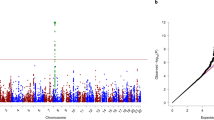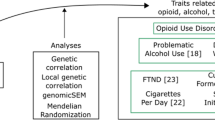Abstract
The receptors for tetrahydrocannabinol, the active ingredient of marijuana, have been identified. A microsatellite polymorphism (AAT)n at the cannabinoid CB1 (brain) receptor gene (CNR1) consists of 9 alleles. Since the cannabinoid system is part of the reward pathway we examined the hypothesis that genetic variants of the CNR1 gene might be associated with susceptibility to alcohol or drug dependence. The study consisted of 92 subjects on an Addiction Treatment Unit (ATU) and 114 controls. All were non-Hispanic Caucasians. The ATU subjects were screened for all types of substance dependence using the Diagnostic Interview Schedule (DIS), and for a variety of substance abuse symptoms using the Addiction Severity Index (ASI). Since inspection of the distribution of alleles in controls vs IV drug use showed a decrease in the frequency of the 4 allele, and the <4 alleles were rare, the alleles were divided into two groups, <5 and ≥5, and three genotypes <5/<5, heterozygotes, and ≥5/≥5. when all variables were subjected to factor analysis, factor 1 showed a clustering of drug dependence variables and factor 2 of alcohol dependence variables. by anova only factor 1 showed significant differences by genotype consistent with a model where homozygosity for the ≥5 repeat alleles showed the greatest effect. the number of iv drugs used was significantly greater for those carrying the ≥5/≥5 genotype than for other genotypes (P = 0.005). The association with specific types of drug dependence was greatest for cocaine, amphetamine, and cannabis dependence. The results are consistent with a role of cannabinoid receptors in the modulation of dopamine and cannabinoid reward pathways. Independent studies should be designed to further confirm the hypothesis that cannabinoid receptors may contribute to the susceptibility to drug abuse.
This is a preview of subscription content, access via your institution
Access options
Subscribe to this journal
Receive 12 print issues and online access
$259.00 per year
only $21.58 per issue
Buy this article
- Purchase on Springer Link
- Instant access to full article PDF
Prices may be subject to local taxes which are calculated during checkout
Similar content being viewed by others
Author information
Authors and Affiliations
Rights and permissions
About this article
Cite this article
Comings, D., Muhleman, D., Gade, R. et al. Cannabinoid receptor gene (CNR1): association with IV drug use. Mol Psychiatry 2, 161–168 (1997). https://doi.org/10.1038/sj.mp.4000247
Received:
Revised:
Accepted:
Issue Date:
DOI: https://doi.org/10.1038/sj.mp.4000247
Keywords
This article is cited by
-
Role of mesolimbic cannabinoid receptor 1 in stress-driven increases in cocaine self-administration in male rats
Neuropsychopharmacology (2023)
-
The cannabinoid receptor-1 gene interacts with stressful life events to increase the risk for problematic alcohol use
Scientific Reports (2022)
-
Pharmacogenetics of Cannabinoids
European Journal of Drug Metabolism and Pharmacokinetics (2018)
-
Genetic and Environmental Factors Associated with Cannabis Involvement
Current Addiction Reports (2016)
-
Endocannabinoid signalling in reward and addiction
Nature Reviews Neuroscience (2015)



